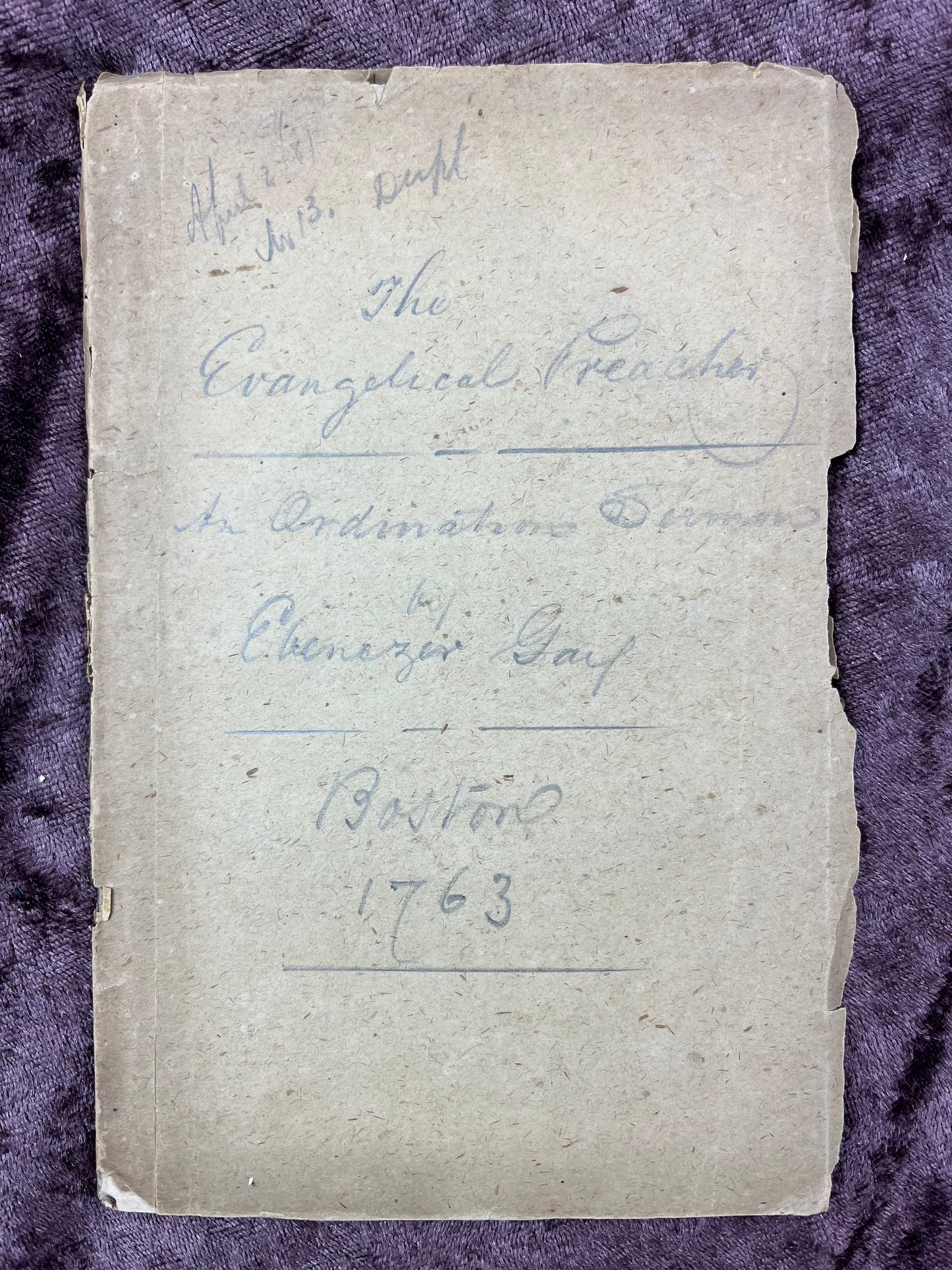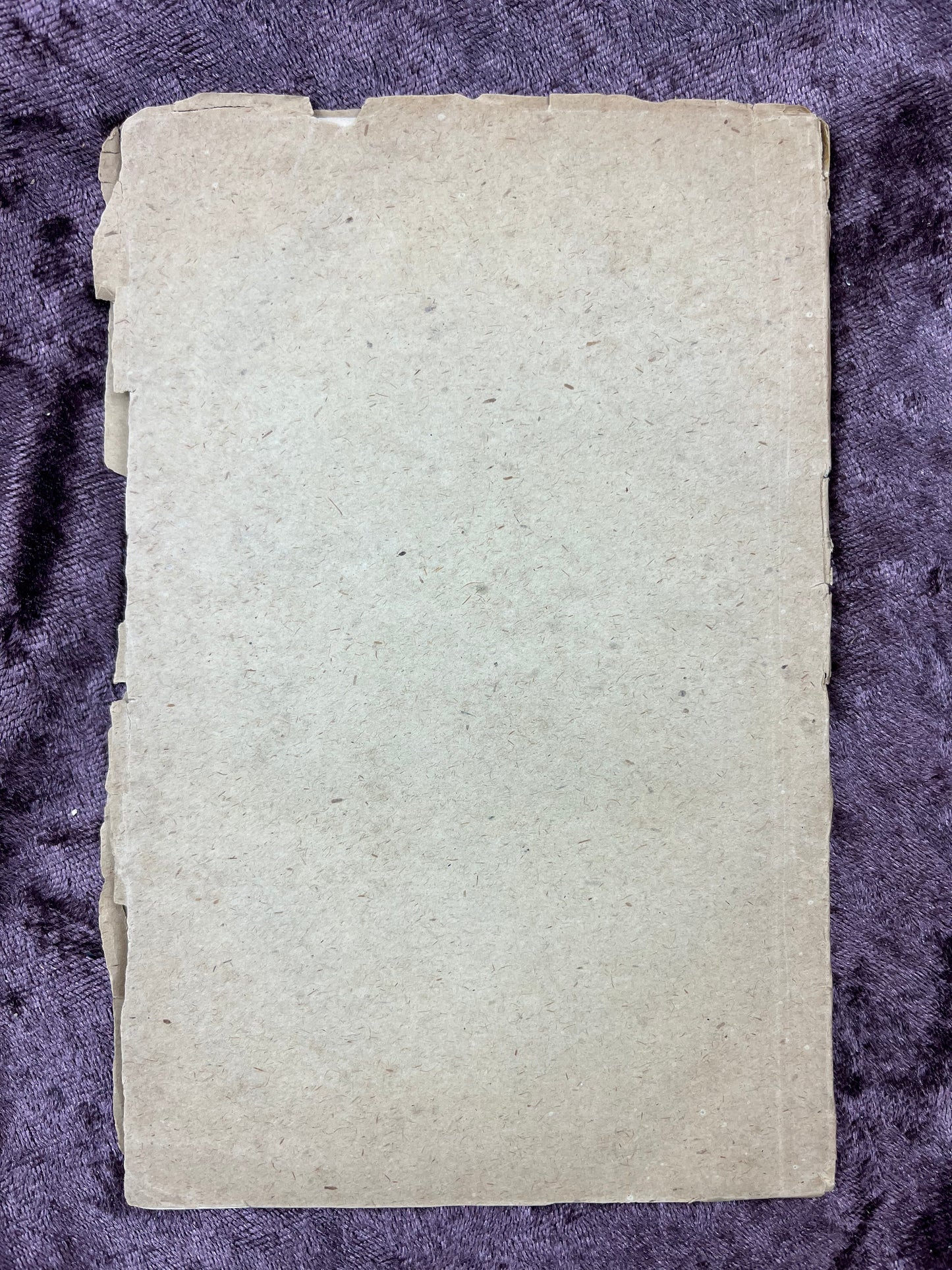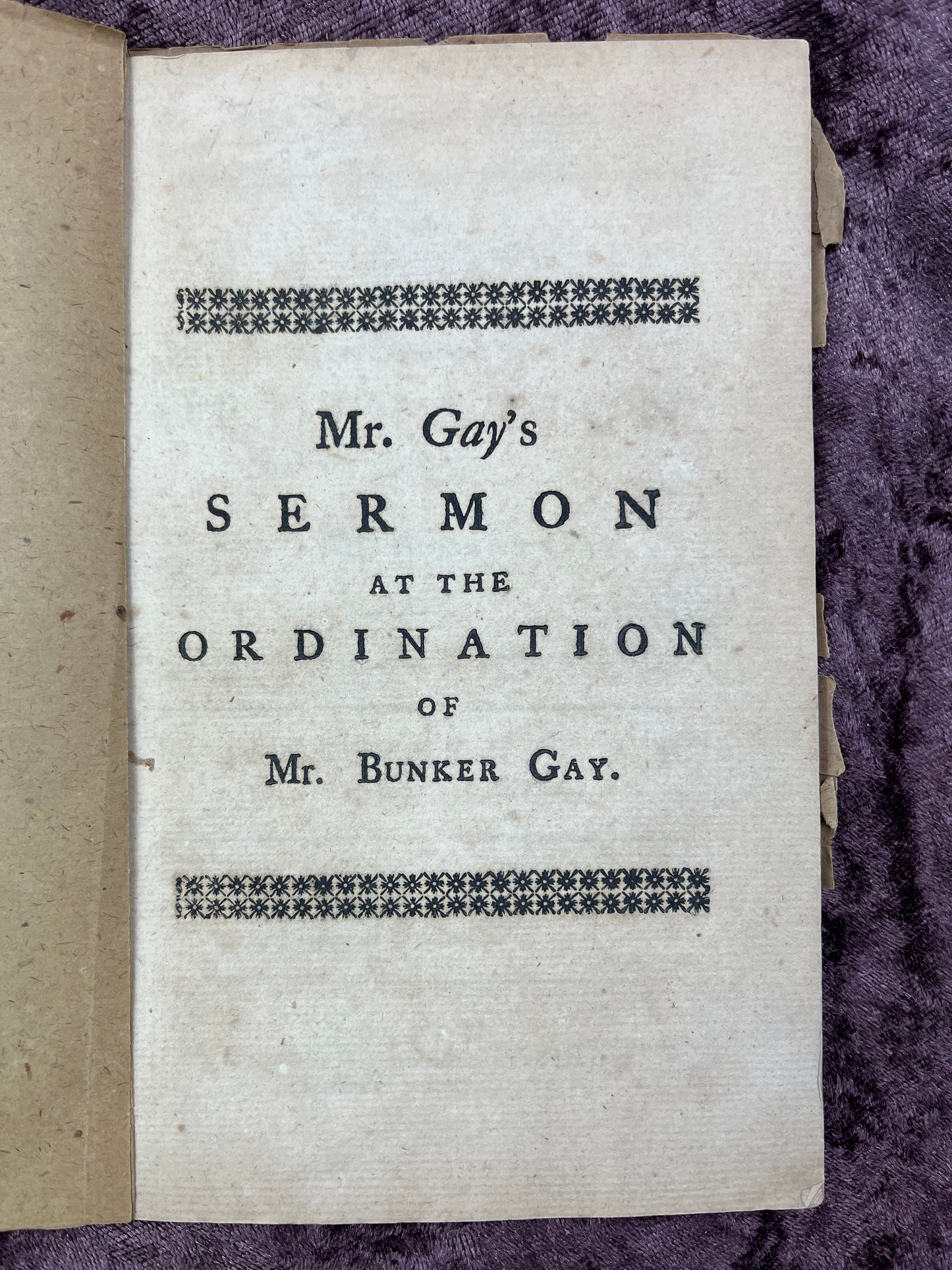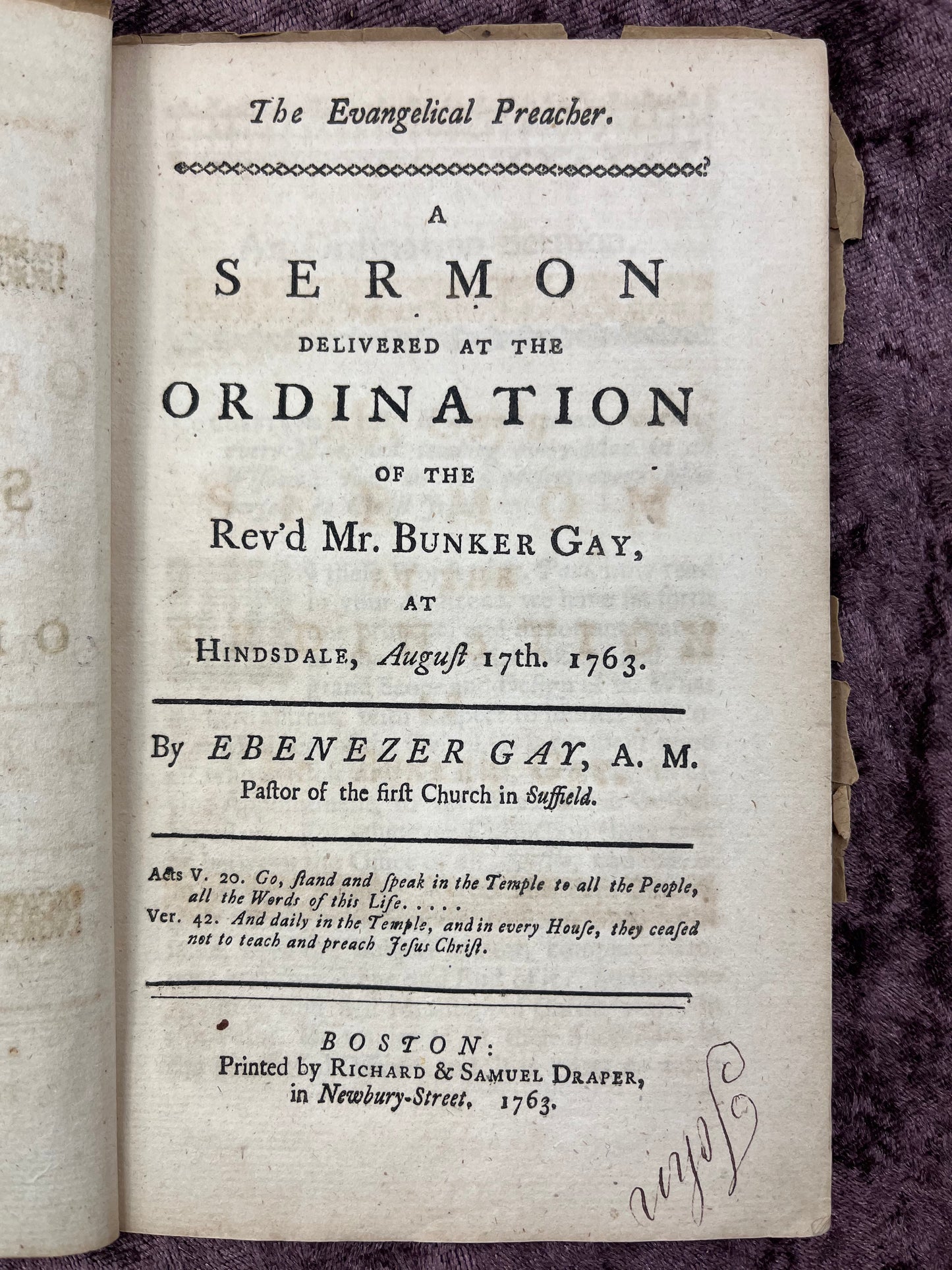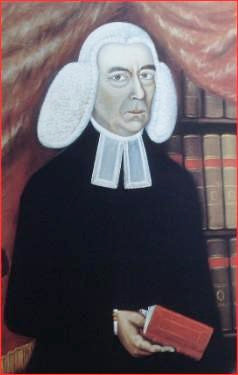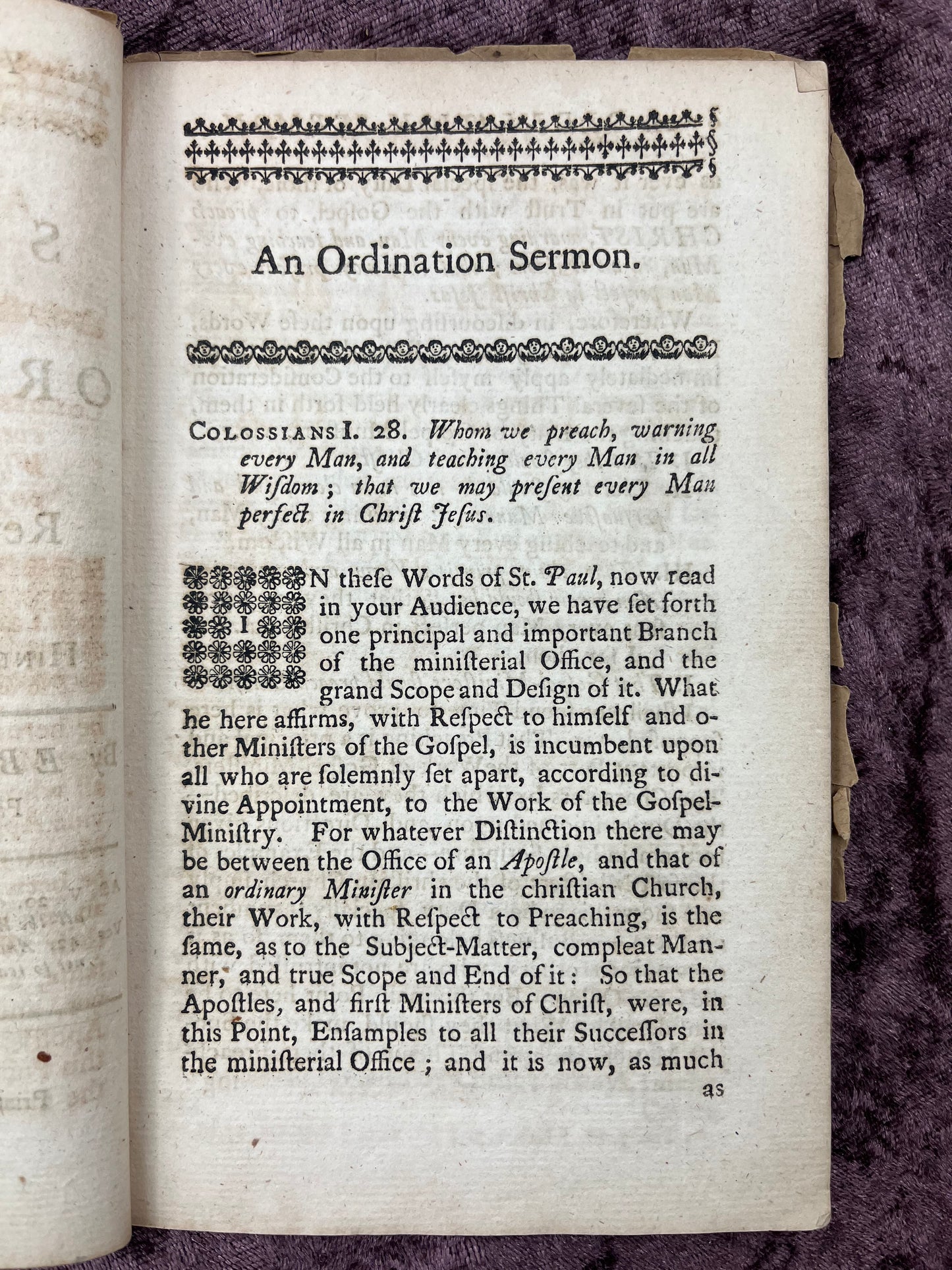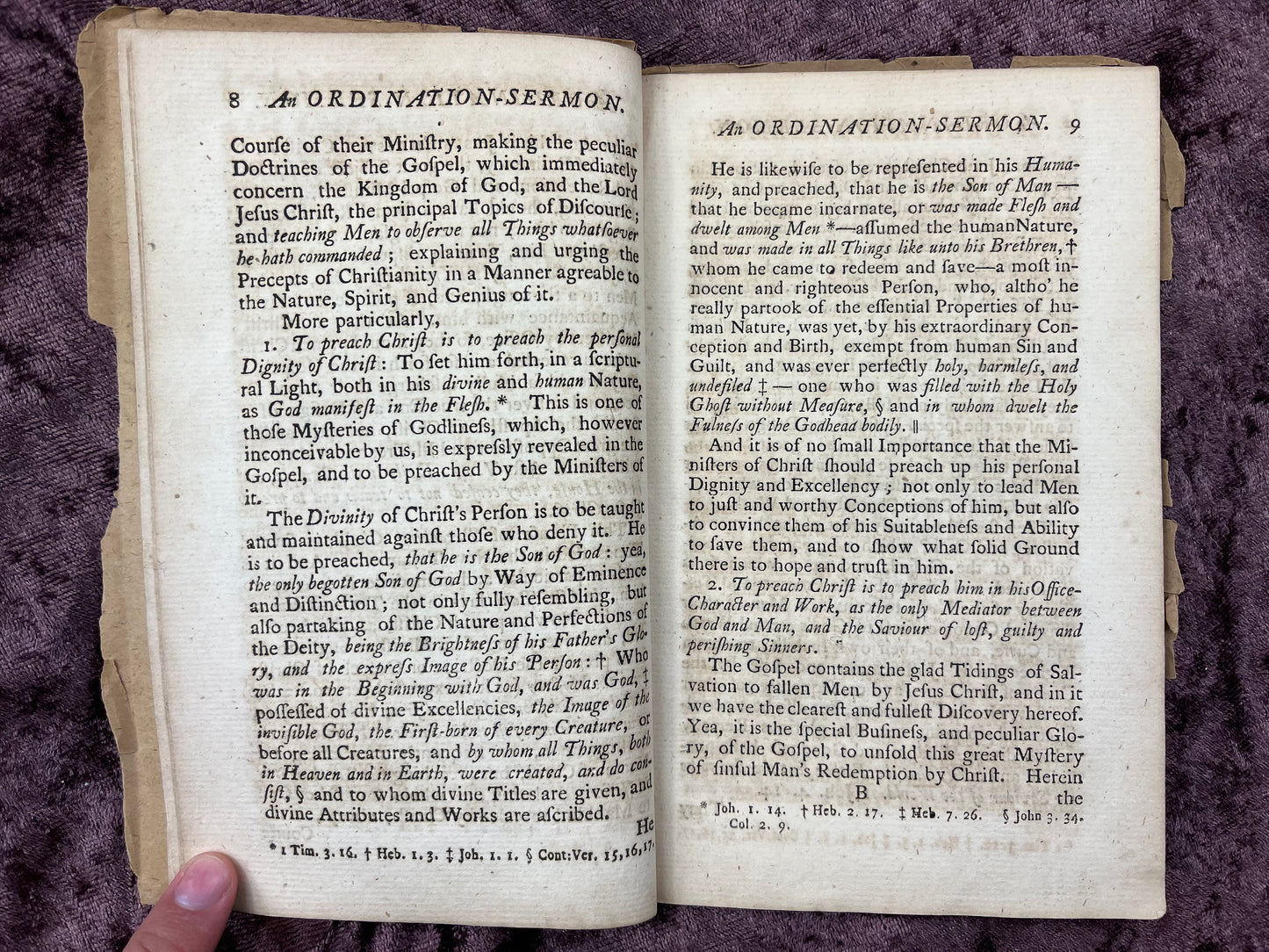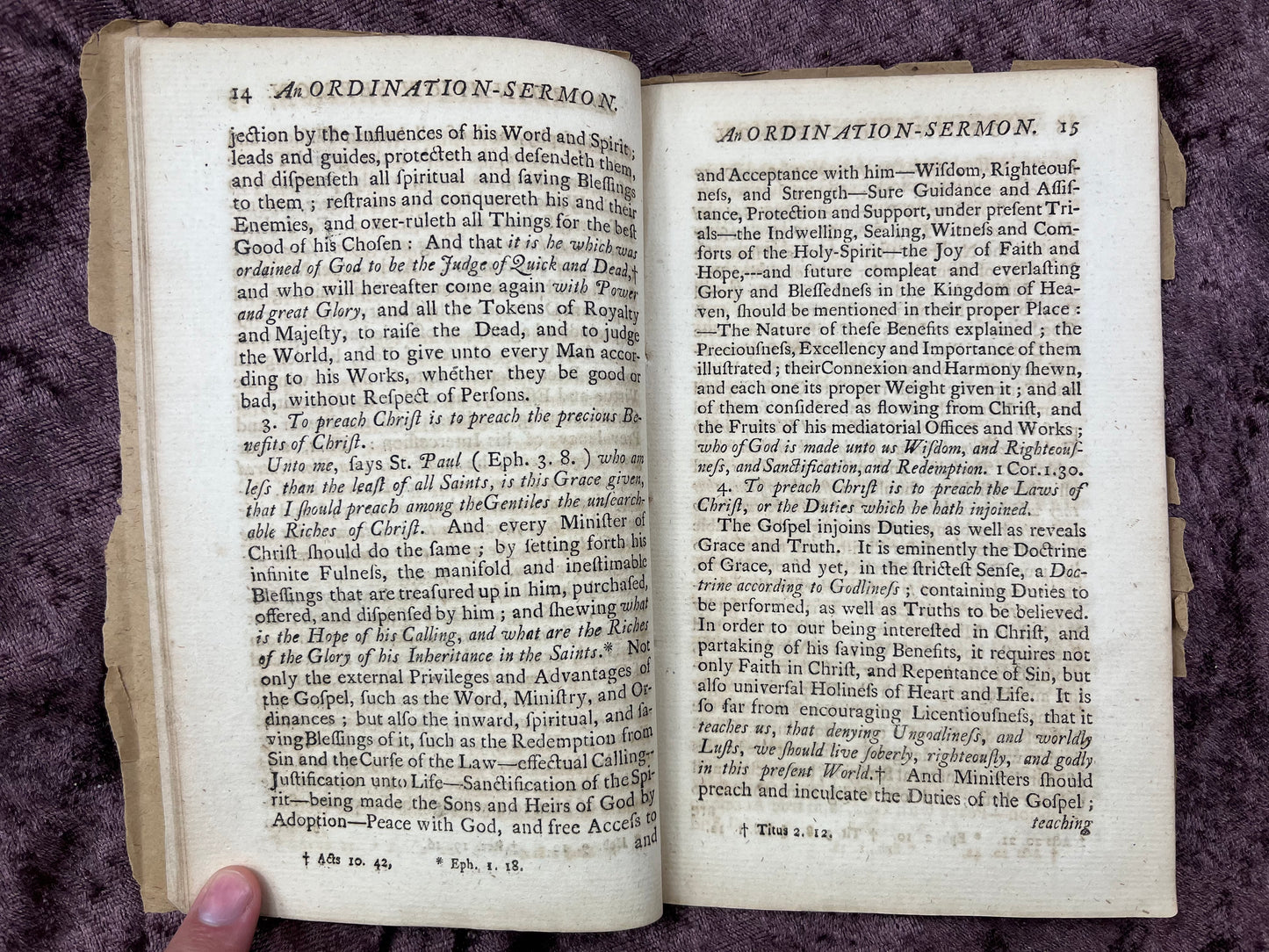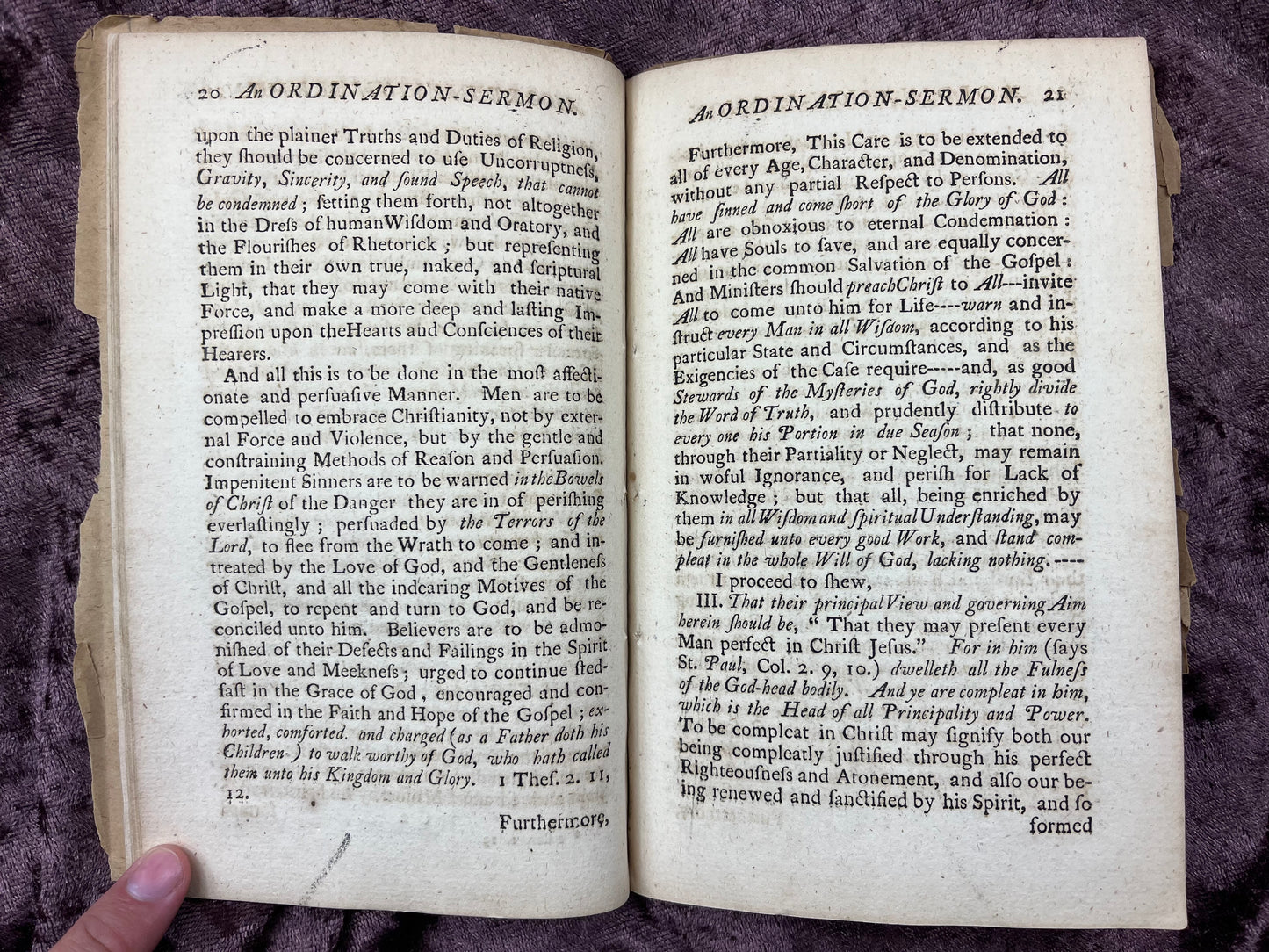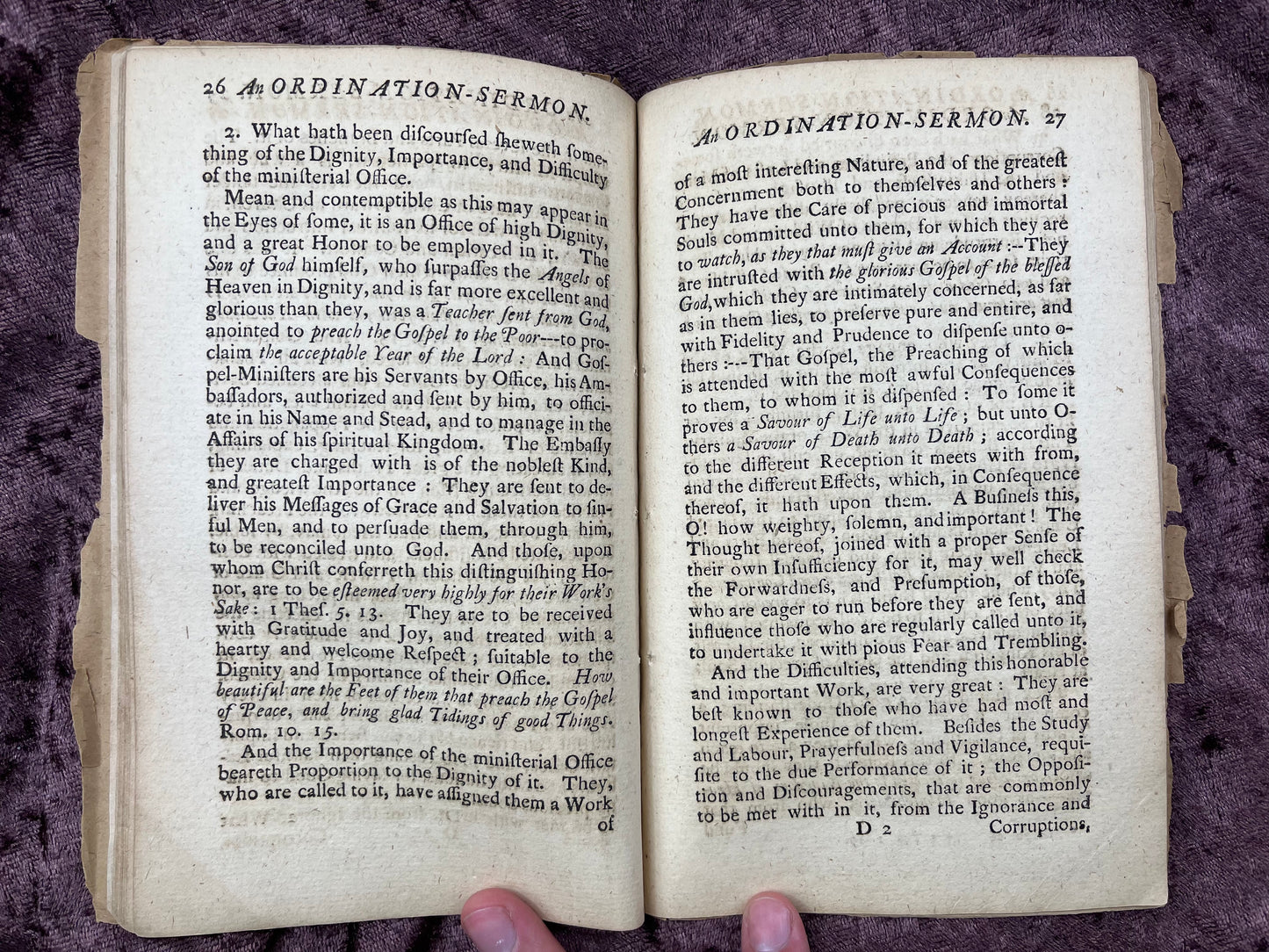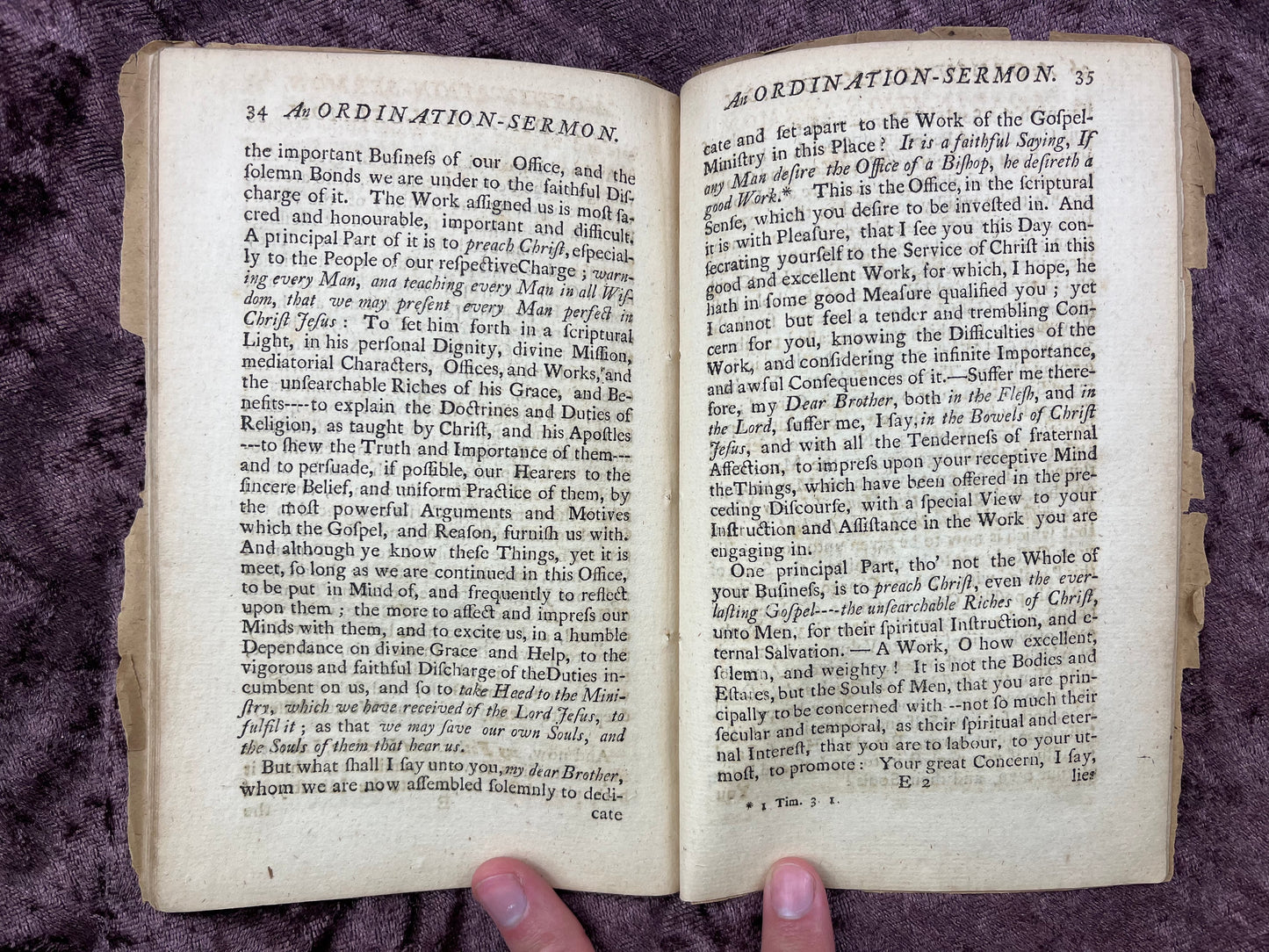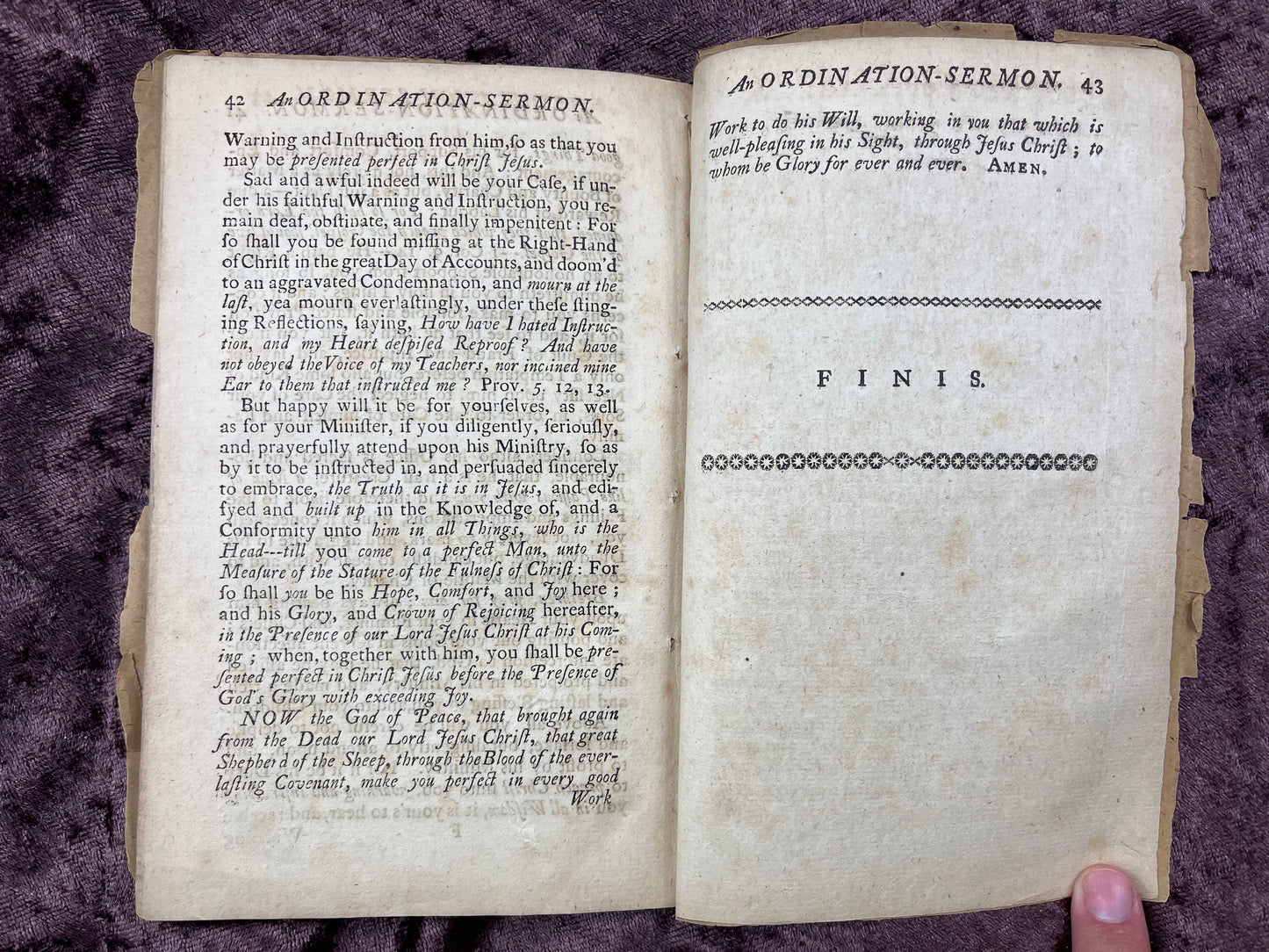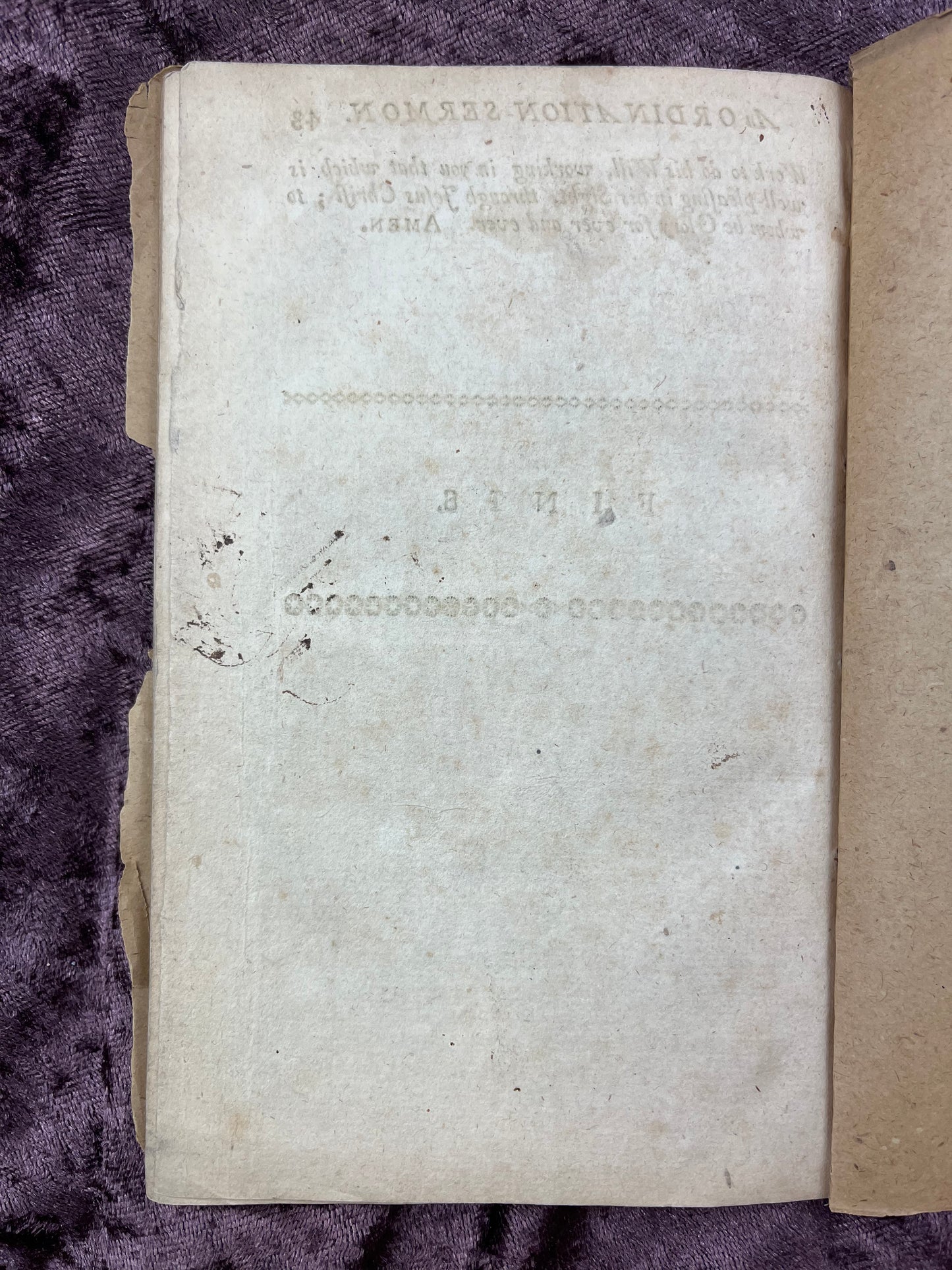1763 Octavo First Edition Pamphlet The Evangelical Preacher Sermon Delivered At The Ordination Of Rev. Bunker Gay By Ebenezer Gay-The Rev. Known As The Father Of American Unitarianism
1763 Octavo First Edition Pamphlet The Evangelical Preacher Sermon Delivered At The Ordination Of Rev. Bunker Gay By Ebenezer Gay-The Rev. Known As The Father Of American Unitarianism
Couldn't load pickup availability
Share
Importance: Ebenezer Gay was the youngest son of Nathaniel and Lydia Gay, and was born in Dedham, Mass., August 15, 1696. He was prepared for college at the town school of Dedham, and graduated at Harvard in 1714, then taught the grammar schools in Hadley and Ipswich successively, and in connection with his work as a teacher studied theology. He began preaching in September, 1717, as a candidate for the church in Hingham, where the pulpit had been left vacant by the death of the Rev. John Norton. The result was that on the 30th of December following he received a call to become pastor of the church; and on the 11th of June, 1718, he was ordained and installed. The ordination sermon was preached by the Rev. Joseph Belcher, of Dedham.
Mr. Gay brought with him to the ministry a high reputation for scholarship, and, while yet a young man, attracted the particular notice of Governor Burnet, who is said to have remarked that he and Mr. Bradstreet of Charlestown were the most learned of the clergy of New England. In the course of his long life he received many testimonies of public respect. He preached the Artillery Election Sermon in 1728, the General Election Sermon in 1745, the Sermon before the Convention of Congregational Ministers in 1746, and gave the Dudleian Lecture at Harvard in 1750. In 1785 he received the degree of Doctor of Divinity from Harvard College.
Mr. Gay was married on November 3, 1719 to Jerusha, daughter of Samuel Bradford, of Duxbury, who was the grandson of Governor Bradford. Mrs. Gay died August 1, 1783, aged eighty-five years. She was the mother of eleven children, five sons and six daughters. Dr. Gay lived to be ninety-one, and retained his faculties in remarkable vigor until the close of his life. On Sunday morning, the 8th of March, 1787, while preparing for the regular service, he was attacked with sudden illness and died almost instantly. The length of his ministry was sixty-eight years, nine months, and seven days. The funeral sermon was preached by Dr. Shute of the Second Parish in Hingham.
Dr. Gay has often been called the father of American Unitarianism. President John Adams, in a letter to Dr. Morse, dated May 1, 1815, wrote, “Sixty years ago my own minister, Rev. Lemuel Briant, Dr. Jonathan Mayhew of the West Church in Boston Rev. Mr. Shute of Hingham, Rev. John Brown of Cohasset, and, perhaps equal to all, if not above all, Rev. Dr. Gay, of Hingham, were Unitarians.” Like most of his contemporaries, Dr. Gay was not given to accurately defining his doctrinal position; but it is recorded that “his discourses will be searched in vain for any discussions of controversial theology, in advocacy of the peculiar doctrines known as orthodox, or the expression of any opinions at variance with those of his distinguished successor in the same pulpit, Rev. Dr. Ware.” The liberalizing influence of Dr. Gay was exercised chiefly through personal intercourse; in his own parish, over the pupils who resorted to him, and with his ministerial associates.
Dr. Gay’s name is signed to a paper entitled “The Sentiments and Resolutions of an Association of Ministers convened at Weymouth, January 15, 1743,” in which they bear testimony against Whitefield’s preaching as “having a tendency to promote a spirit of bitterness.” They further declare that they will not encourage him to preach, either publicly or privately, in their respective parishes. This association of ministers, in which Dr. Gay was apparently the leading spirit, included a number of neighboring ministers, all of whom were recognized as “liberal,” and who were forerunners of the Unitarian movement. Besides the ministers named by John Adams, this group contained Dr. Barnes, of Scituate, Dr. Hitchcock of Pembroke, and later Dr. Gay’s parishioner and pupil, Joseph Thaxter. These neighbors and friends enjoyed entire harmony in their religious opinions, and formed what seems to have been the first ministerial association in New England to hold the convictions which later became known as Unitarian. They were, however, much averse to controversy. They did not conceal their opinions when challenged, but they declined argument.
Besides his intimacy with his neighbors, Dr. Gay was a warm friend of Jonathan Mayhew, whose biographer declares that Mayhew was indebted to Dr. Gay for the adoption or confirmation of the “liberal and rational views” which he embraced. Others are of the opinion that Dr. Gay acquired his liberal views from his more aggressive friend and pupil. Dr. Gay preached the sermon at Mayhew’s ordination in 1747, and another on his death in 1766. Dr. Gay’s daughter married Mayhew’s successor, Simeon Howard.
A close intimacy also existed between three of the patriarchs of the Massachusetts churches, Dr. Gay, Dr. Chauncy of the First Church in Boston, and Dr. Appleton of the First Church in Cambridge. Hon. Alden Bradford, in his historical sketch of Harvard College, written in 1787, speaks of his recollection of seeing these three venerable men walking to the college chapel together, two being nearly ninety years old, and the other, Dr. Chauncy, about eighty-three. Chauncy and Gay died in the same year; Appleton died three years earlier. At the ordination of Simeon Howard as pastor of the West Church in Boston in succession to Jonathan Mayhew, Dr. Chauncy preached the sermon, Dr. Gay gave the charge, and Dr. Appleton gave the right hand of fellowship.
In the Revolutionary period Dr. Gay adhered to Tory sentiments, and continued for years to pray for the king and all the royal family, yet such was his discretion that he maintained his position at the head of a parish largely composed of supporters of the Declaration of Independence without seriously impairing his usefulness. Mr. Solomon Lincoln has recorded this anecdote of these times: It was a part of the duty of the Committee of Correspondence, Inspection, and Safety to call upon suspected citizens, and those known to be Loyalists, to demand a search for arms. It was proposed that the committee should call upon Dr. Gay, and demand his arms, probably not because they supposed he had any of which he would make improper use against the new government, but because the opportunity was a good one to give him a sort of official admonition that he held obnoxious sentiments, in which some of the most influential of his people did not share. That the thing to be done was a little aggravating did not take away the zest of doing it. It would have been ungenerous, also, had there not been a very perfect accord between Dr. Gay and his parish, as pastor and people, on all subjects save politics. The committee presented themselves before the doctor, who received them in his study, standing, and with entire calmness and dignity, when he inquired of them, “What do you wish with me, gentlemen?” “We have come, sir, in accordance with our duty, as the Committee of Safety, to ask you what arms you have in the house.” He looked at them kindly, perhaps a little reproachfully, for a moment or two before answering, and then said, laying his hand upon a large Bible on the table by which he stood, “There, my friends, are my arms; and I trust to find them ever sufficient for me.” The committee retired with some precipitation, discomfited by the dignified manner and implied rebuke of Dr. Gay; and the chairman was heard to say to his associates as they passed out of the yard, “The old gentleman is always ready.”
Notwithstanding the political opinions entertained by Dr. Gay, he continued to find among the ministers who held opposite views his most ardent friends. The intercourse between him and Dr. Shute, of the Second Parish, who was a zealous Whig, remained of the most friendly character; and he was on most excellent terms with Mr. Smith, of Weymouth (the father of Mrs. John Adams), and Mr. Brown, of Cohasset, who at one time was a chaplain to the troops in Nova Scotia before the Revolution. Dr. Gay’s son, Jotham Gay, was a captain in another regiment. The doctor, in writing to Mr. Brown, says, “I wish you may visit Jotham, and minister good instruction to him and his company, and furnish him with suitable sermons in print, or in your own legible if not very intelligible manuscripts, to read to his men, who are without a preacher, in the room of one, constitute Jotham curate.”
The earliest sermon of Dr. Gay’s which was printed was delivered at the ordination of the Rev. Joseph Green at Barnstable. Toward the close of this discourse we find the following passage in Dr. Gay’s peculiar vein. He was speaking of the candidate for ordination, Joseph Green, and he said: “We trust that he will be a Joseph unto his brethren whom he is to feed with the bread of life, and that God sendeth him here to preserve their souls from perishing. The Lord make him a fruitful bough, even a fruitful bough by a well, grafted into the tree of life, and always green and flourishing in the courts of our God.”
Dr. Gay was remarkable in the selection and application of his texts. Having for a long time been unsuccessful in procuring a well of water for his homestead, he introduced the subject into his prayers and also preached a sermon on Numbers xxi. 17,—”Then Israel sang this song: Spring up, 0 well, sing ye unto it.” The text of his sermon preached at the installation of the Rev. Ezra Carpenter at Keene, in 1750, was Zachariah ii. 1: “I lift up mine eyes again and look, and behold a man with a measuring line in his hand.” His feeling in regard to written articles of faith was expressed in 1751, in a sermon at the ordination of the Rev. Jonathan Dorby at Scituate: “And ‘tis a pity any man, at his entrance into the ministry, should, in his ordination vows, get a snare to his soul by subscribing or any way engaging to preach according to another’s rule of faith, creed, or confession, which is merely of human prescription and imposition.”
Source: *Harvard Square Library.
Binding: Paper Wrapped Octavo Pamphlet. Chipped.
Provenance: Recto of the title page is signed John
Collation & Notes: A4 ([A1r] H.T. & [A2r] G.T.P.), B4, C4, D4, E4, F2 (ends F2r). [22] ff. 43, [1] p. (44 pages).
Complete, with an original half title & title page. Vertical chain lines. WorldCat & OCLC records 13 copies. Evans 9394.
Condition: Leaves (7.75” x 5”). Nothing notable.
